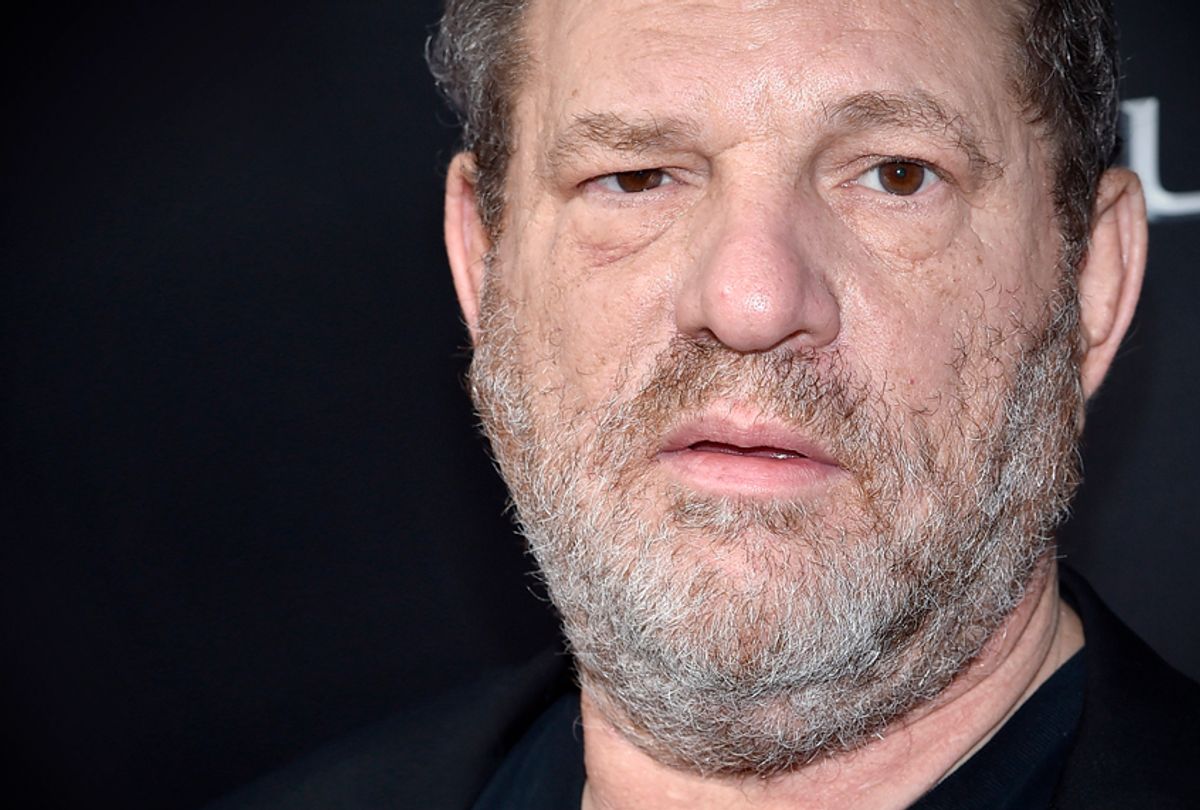I don't buy Harvey Weinstein's apology. I realize this isn't really a novel opinion, as social media is burning up with people mocking the statement he released to the New York Times after Times reporters Jodi Kantor and Megan Twohey published an exposé chronicling decades of allegations of sexual harassment against the renowned studio executive. Still, it's an opinion worth explicating because the excuses that Weinstein trots out in his statement are the kinds of excuses that sexual harassers and abusers all too often get away with, even in the 21st century.
Weinstein is trying to gaslight us all. An insincere apology is no apology at all, and people should not accept it.
"I came of age in the 60’s and 70’s, when all the rules about behavior and workplaces were different. That was the culture then," Weinstein wrote. "I have since learned it’s not an excuse, in the office -- or out of it. To anyone."
First, if it's not an excuse, then why offer it up as one? Second, the claim that he didn't know any better is particularly hard to believe in light of the eight legal settlements — that we know about — uncovered by the Times. After you have repeatedly paid out hundreds of thousands of dollars to women who say you have behaved inappropriately, that might have been a clue that something was wrong.
But mostly, the whole "I didn't know better" claim, common to sexual harassers, needs to be understood as the nonsense that it is. Sexual harassers know better. They know it's wrong. They know their behavior upsets women.
That's why they do it.
A lot of sexual harassers want to pass off their behavior as merely awkward or unwelcome advances, knowing that draws sympathy. Who among us hasn't flirted with someone who didn't flirt back? Who hasn't worried about asking someone out for fear of rejection? That's how the harassers want you to imagine them: hapless Romeos, guilty not of being cruel but of having no game.
Well, don't believe it. As most women who've been targeted by creeps — which is most women, by the way — can tell you, what is usually obvious is how much of the creep's pleasure depends on knowing he's making you uncomfortable.
The stories relayed by women to the Times reporters suggest that's the case here. Many of the women describe Weinstein making excuses to get them alone in a hotel room. Making sure there are no witnesses to the behavior doesn't suggest a well-meaning guy who doesn't know better, but someone who knows exactly what he's doing and how he plans to get away with it.
What Weinstein is described doing, once he was alone with a woman, also cuts against the notion that any offense was accidental.
"In interviews, eight women described varying behavior by Mr. Weinstein: appearing nearly or fully naked in front of them, requiring them to be present while he bathed or repeatedly asking for a massage or initiating one himself," Kantor and Twohey write. Ashley Judd reported that he asked her to watch him shower.
These actions are, to put it plainly, weird. This isn't what you do when you're flirting or hitting on someone. Most people, even the most socially awkward among us, know that you don't open by trying to take your clothes off. If you're actually trying to get someone in bed for consensual and mutually pleasurable activities, you try to make it fun for that person by flirting and feeling out how they feel about you. You don't just come right out and ask for weird stuff.
It especially defies credulity to ask people to believe that a film producer as successful as Weinstein is incapable of recognizing and understanding social cues. His entire job is built around either talking people into giving him money or convincing them to sign onto risky and time-intensive moviemaking projects, a skill that requires a well-honed ability to read people. It beggars belief to imagine that he was unaware of the disgust and discomfort he was causing.
Sexual harassment isn't an accident, and it's not the result of social awkwardness or a failure to understand the "new" rules for how to treat women. It's not a mental illness.
Sexual harassment is, as Irene Bremis put it when I was on Sirius with her recently, just plain bullying. The fun of it for harassers may be sexualized, but it's not really about sex. It's about that feeling of power one gets from making someone else feel uncomfortable and helpless. That domineering feeling is compounded when the target is unable to do anything about it, either because she won't be believed or because her harasser is willing to pull on his immense resources to destroy her life for speaking out.
It's good to see that many people can see right through Weinstein's excuses. It would be even better if we all start to see through it when other men who are less in the limelight make similar excuses for their own bad behavior.



Shares